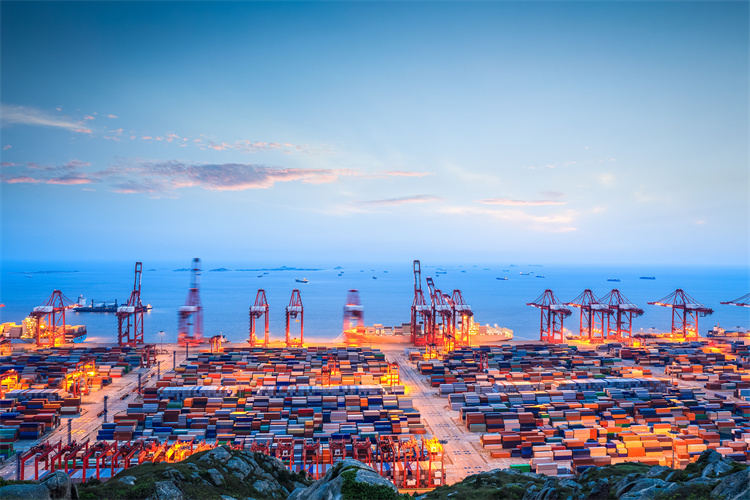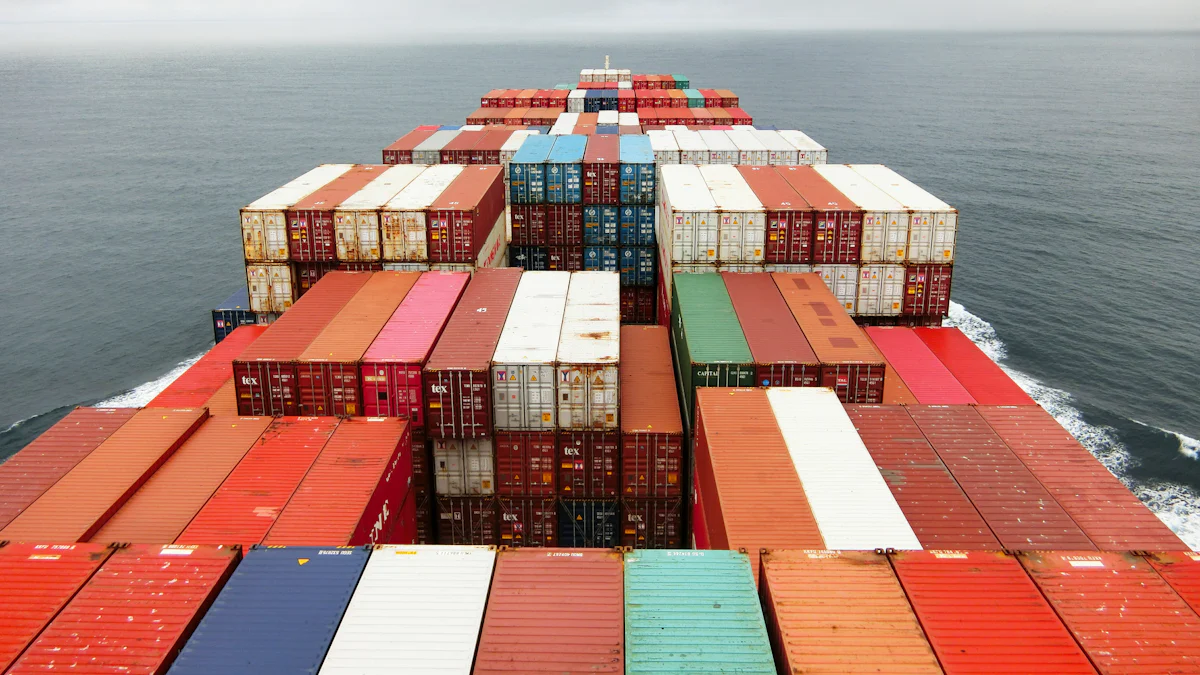Global Logistics: Navigating Current Challenges

The global logistics industry plays a vital role in facilitating international trade and economic growth. The industry has witnessed significant expansion, with the market size projected to reach around USD 21.91 trillion by 2033. However, the industry faces numerous challenges that threaten its stability and efficiency. Economic fluctuations, technological advancements, and environmental concerns present hurdles that require strategic solutions. Addressing these challenges is crucial for ensuring sustainable growth and resilience in the future. The industry's ability to adapt and innovate will determine its success in navigating the evolving global landscape.
Current State of the Global Logistics Industry
Overview of the Global Supply Chain
The global logistics industry serves as the backbone of international trade. The industry facilitates the movement of goods and services across the world. Key players in this sector include multinational corporations, freight forwarders, and third-party logistics providers. These entities operate in regions such as North America, Europe, and Asia-Pacific. The logistics market categorizes based on manufacturers, regions, type, and application.
Recent trends in the global logistics industry highlight significant transformations. The rise of e-commerce and globalization drives rapid changes. Technological advancements further accelerate this evolution. The emergence of last-mile deliveries and logistics automation stands out as notable trends. The industry's focus shifts towards enhancing efficiency and customer satisfaction.
Impact of Global Events on the Global Logistics Industry
Economic shifts significantly impact the global logistics industry. Fluctuations in demand and supply create challenges for shippers and carriers. Inflation and other economic conditions contribute to a turbulent environment. The logistics market experiences growth despite these challenges. Projections indicate a compound annual growth rate (CAGR) of 9.6% from 2023 to 2030.
Political and regulatory changes also influence the global logistics industry. Trade policies and regulations affect the movement of goods. Companies must adapt to varying rules across different regions. Compliance with international standards becomes crucial for success. The logistics industry navigates these complexities to maintain operational efficiency.
Major Challenges in the Global Logistics Industry

Technological Challenges
Integration of New Technologies
The logistics industry faces significant challenges in integrating new technologies. Companies must adopt advanced systems to enhance operational efficiency. The use of Artificial Intelligence (AI) in logistics operations demonstrates potential benefits. Successful implementation of AI can optimize supply chain processes. For instance, a case study on AI in logistics highlights improved efficiency and decision-making. However, the integration process requires substantial investment and expertise.
Cybersecurity Concerns
Cybersecurity remains a critical concern for the logistics sector. The increasing reliance on digital platforms exposes companies to cyber threats. Protecting sensitive data and ensuring system integrity are paramount. The logistics industry must implement robust security measures. Regular audits and updates can mitigate risks. Companies must prioritize cybersecurity to maintain trust and reliability.
Environmental and Sustainability Issues
Carbon Footprint Reduction
Environmental concerns pose significant challenges for logistics providers. Reducing carbon emissions is essential for sustainable operations. Companies must adopt eco-friendly practices to minimize environmental impact. The implementation of green logistics initiatives can lead to significant improvements. For example, optimizing transportation routes can reduce fuel consumption. The logistics industry must focus on sustainability to meet regulatory requirements.
Sustainable Practices and Innovations
Innovations in sustainable practices are crucial for the logistics sector. Companies must explore alternative energy sources and materials. The adoption of electric vehicles and renewable energy can enhance sustainability. A focus on sustainable packaging solutions can also contribute to environmental goals. The logistics industry must embrace innovation to achieve long-term sustainability.
Market and Consumer Demands
E-commerce Growth
The rapid growth of e-commerce presents challenges for logistics providers. Companies must adapt to increased demand for fast and reliable deliveries. Efficient last-mile delivery solutions are essential to meet consumer expectations. The logistics industry must invest in technology and infrastructure to support e-commerce growth. A case study on logistics optimization for Iconic Protein highlights increased efficiency in global shipments.
Changing Consumer Expectations
Consumer expectations continue to evolve, impacting logistics operations. Customers demand transparency and real-time tracking of shipments. The logistics industry must enhance customer service and communication. Implementing advanced tracking systems can improve customer satisfaction. Companies must remain agile to adapt to changing market demands.
Strategies for Overcoming Challenges in the Global Logistics Industry
Technological Solutions
Automation and AI
Automation and Artificial Intelligence (AI) revolutionize logistics operations. Companies implement AI to streamline processes and reduce costs. AI optimizes supply chain management by enhancing route planning and improving operational visibility. AI-enabled chatbots deliver quick customer service responses. These advancements elevate efficiency and accuracy in logistics.
Expert Testimony:
"AI is transforming the logistics industry, making it more efficient and cost-effective with automation, predictive analytics, and machine learning. AI-enabled chatbots provide quick customer service answers – revolutionizing supply chain management by optimizing routes, improving visibility into operations, and providing customers with accurate delivery estimates."
Blockchain and Data Analytics
Blockchain technology enhances transparency and security in logistics. Companies use blockchain to track shipments and verify transactions. This technology ensures data integrity and reduces fraud risks. Data analytics provides valuable insights into logistics operations. Companies utilize analytics to forecast demand and optimize inventory management. These technologies empower logistics providers to make informed decisions.
Enhancing Sustainability
Green Logistics Initiatives
Green logistics initiatives focus on reducing environmental impact. Companies adopt eco-friendly practices to minimize carbon emissions. Optimizing transportation routes decreases fuel consumption. The use of electric vehicles contributes to sustainability goals. Logistics providers prioritize green initiatives to comply with regulations and improve their environmental footprint.
Expert Testimony:
"AI can help you find the most efficient routes, taking in factors such as distance, real-time traffic, vehicle capacity, and delivery time windows. This reduces the fuel emissions of the vehicle, whilst maintaining customer satisfaction."
Collaboration with Environmental Organizations
Collaboration with environmental organizations strengthens sustainability efforts. Logistics companies partner with these organizations to develop innovative solutions. Joint initiatives focus on sustainable packaging and waste reduction. These collaborations drive positive change and promote environmental responsibility. Companies benefit from shared knowledge and resources in achieving sustainability objectives.
Adapting to Market Changes
Flexible Supply Chain Models
Flexible supply chain models enhance adaptability in a dynamic market. Companies implement agile strategies to respond to fluctuations in demand. These models enable quick adjustments to production and distribution processes. Flexibility ensures continuity and resilience in logistics operations. Companies that embrace adaptable supply chains gain a competitive edge.
Customer-Centric Approaches
Customer-centric approaches prioritize consumer needs and preferences. Companies invest in advanced tracking systems for real-time shipment updates. Enhanced communication improves customer satisfaction and loyalty. Logistics providers focus on delivering personalized experiences. Meeting evolving consumer expectations strengthens brand reputation and market position.
The global logistics industry faces significant challenges, including technological integration, environmental concerns, and evolving market demands. Strategic solutions remain essential for overcoming these hurdles. Companies must adopt innovative technologies and sustainable practices to enhance operational efficiency. The future outlook for the industry appears promising. Emerging trends indicate a shift towards ethical supply chain management and eco-friendly logistics. Businesses must prioritize reducing their carbon footprint and meeting consumer expectations. The logistics sector will continue to evolve, driven by advancements in technology and a commitment to sustainability.
See Also
Navigating the Future: Logistics Advancements through Digital Innovation
Addressing Global Supply Chain Growth Hurdles
Unraveling Logistics Risk Trends: Understanding the Impact
Transforming Logistics: Supply Chain Innovation's Influence
Pioneering the Future: Breakthroughs in Logistics Technology
